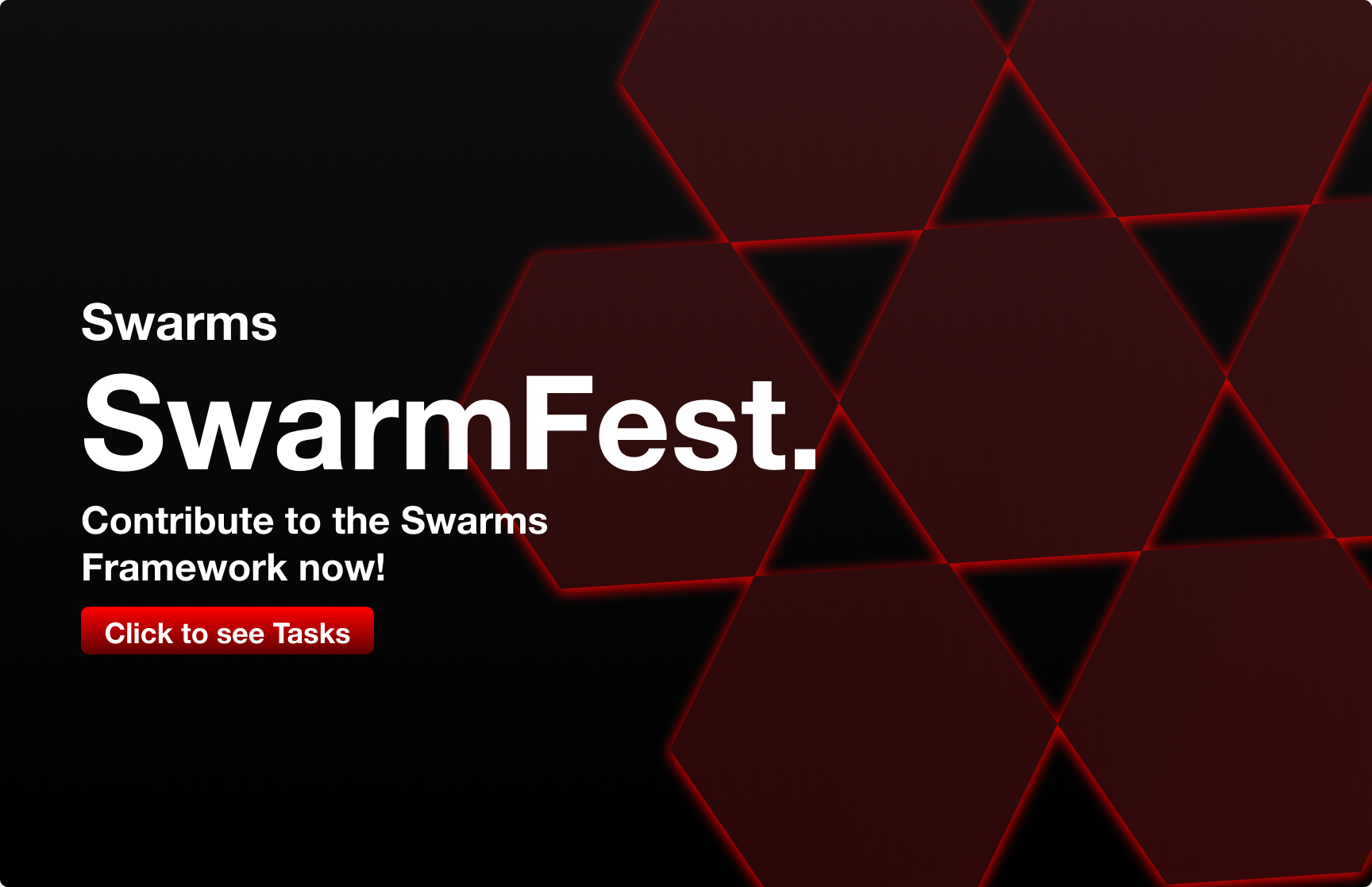|
|
2 years ago | |
|---|---|---|
| .github | 2 years ago | |
| demos | 2 years ago | |
| docs | 2 years ago | |
| images | 2 years ago | |
| playground | 2 years ago | |
| swarms | 2 years ago | |
| tests | 2 years ago | |
| .env.example | 2 years ago | |
| .gitignore | 2 years ago | |
| .pre-commit-config.yaml | 2 years ago | |
| .readthedocs.yml | 2 years ago | |
| CONTRIBUTING.md | 2 years ago | |
| LICENSE | 2 years ago | |
| README.md | 2 years ago | |
| example.py | 2 years ago | |
| groupchat.py | 2 years ago | |
| mkdocs.yml | 2 years ago | |
| multi_modal_auto_agent.py | 2 years ago | |
| pyproject.toml | 2 years ago | |
| requirements.txt | 2 years ago | |
| sequential_workflow_example.py | 2 years ago | |
README.md
Swarms is a modular framework that enables reliable and useful multi-agent collaboration at scale to automate real-world tasks.
Share on Social Media
Vision
At Swarms, we're transforming the landscape of AI from siloed AI agents to a unified 'swarm' of intelligence. Through relentless iteration and the power of collective insight from our 1500+ Agora researchers, we're developing a groundbreaking framework for AI collaboration. Our mission is to catalyze a paradigm shift, advancing Humanity with the power of unified autonomous AI agent swarms.
🤝 Schedule a 1-on-1 Session
Book a 1-on-1 Session with Kye, the Creator, to discuss any issues, provide feedback, or explore how we can improve Swarms for you.
Installation
pip3 install --upgrade swarms
Usage
We have a small gallery of examples to run here, for more check out the docs to build your own agent and or swarms!
Flow Example
- The
Flowis a superior iteratioin of theLLMChainfrom Langchain, our intent withFlowis to create the most reliable loop structure that gives the agents their "autonomy" through 3 main methods of interaction, one through user specified loops, then dynamic where the agent parses a token, and or an interactive human input verison, or a mix of all 3.
from swarms.models import OpenAIChat
from swarms.structs import Flow
api_key = ""
# Initialize the language model, this model can be swapped out with Anthropic, ETC, Huggingface Models like Mistral, ETC
llm = OpenAIChat(
# model_name="gpt-4"
openai_api_key=api_key,
temperature=0.5,
# max_tokens=100,
)
## Initialize the workflow
flow = Flow(
llm=llm,
max_loops=2,
dashboard=True,
# stopping_condition=None, # You can define a stopping condition as needed.
# loop_interval=1,
# retry_attempts=3,
# retry_interval=1,
# interactive=False, # Set to 'True' for interactive mode.
# dynamic_temperature=False, # Set to 'True' for dynamic temperature handling.
)
# out = flow.load_state("flow_state.json")
# temp = flow.dynamic_temperature()
# filter = flow.add_response_filter("Trump")
out = flow.run("Generate a 10,000 word blog on health and wellness.")
# out = flow.validate_response(out)
# out = flow.analyze_feedback(out)
# out = flow.print_history_and_memory()
# # out = flow.save_state("flow_state.json")
# print(out)
SequentialWorkflow
- Execute tasks step by step by passing in an LLM and the task description!
- Pass in flows with various LLMs
- Save and restore Workflow states!
from swarms.models import OpenAIChat
from swarms.structs import Flow
from swarms.structs.sequential_workflow import SequentialWorkflow
# Example usage
api_key = (
"" # Your actual API key here
)
# Initialize the language flow
llm = OpenAIChat(
openai_api_key=api_key,
temperature=0.5,
max_tokens=3000,
)
# Initialize the Flow with the language flow
flow1 = Flow(llm=llm, max_loops=1, dashboard=False)
# Create another Flow for a different task
flow2 = Flow(llm=llm, max_loops=1, dashboard=False)
# Create the workflow
workflow = SequentialWorkflow(max_loops=1)
# Add tasks to the workflow
workflow.add("Generate a 10,000 word blog on health and wellness.", flow1)
# Suppose the next task takes the output of the first task as input
workflow.add("Summarize the generated blog", flow2)
# Run the workflow
workflow.run()
# Output the results
for task in workflow.tasks:
print(f"Task: {task.description}, Result: {task.result}")
Documentation
- For documentation, go here, swarms.apac.ai
Contribute
- We're always looking for contributors to help us improve and expand this project. If you're interested, please check out our Contributing Guidelines and our contributing board
License
MIT
















